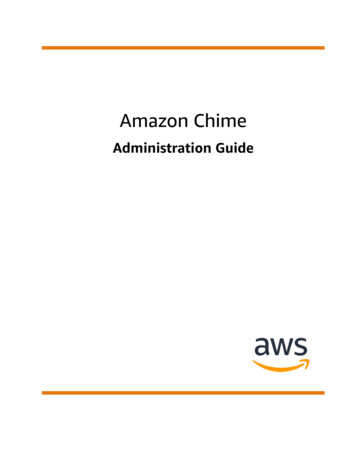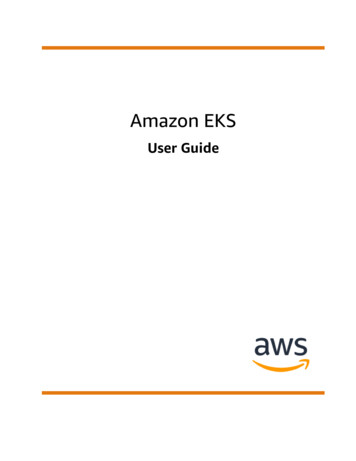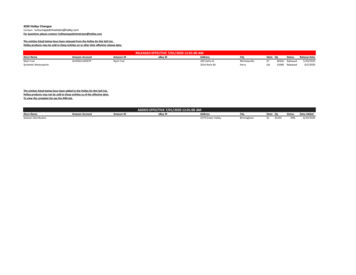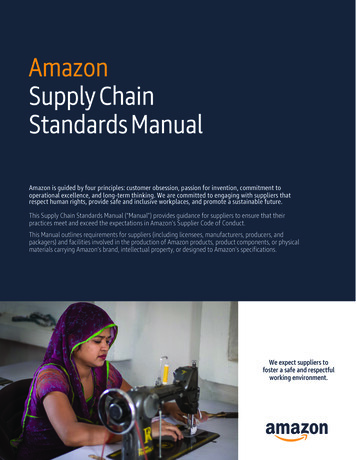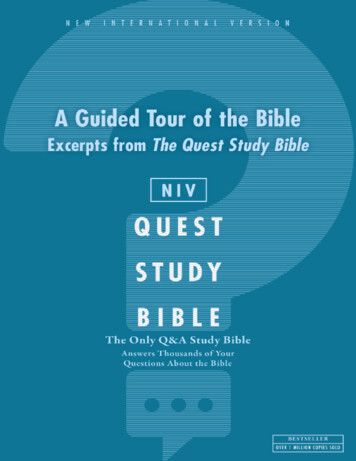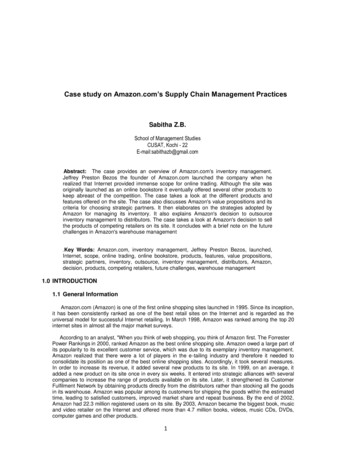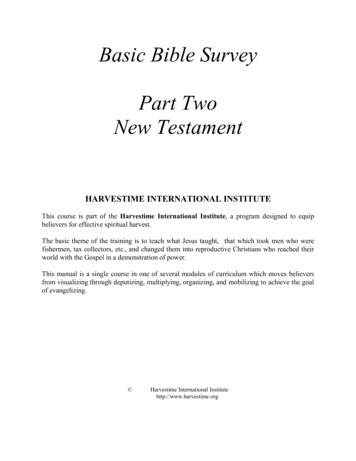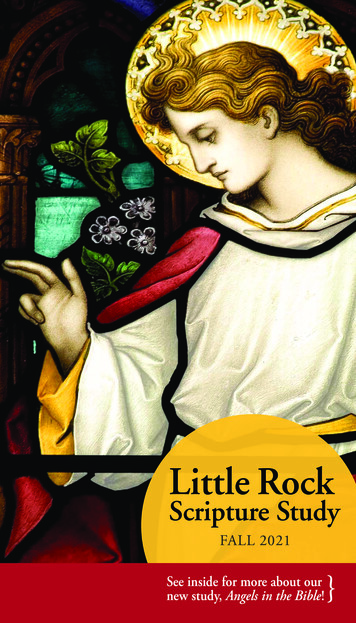
Transcription
Basic BibleStudyThirteen Practical Steps – Part One
Why is accurate Bible study necessary?“To determine what God has said is a high and holy task. Withfear and trembling each should be ever so careful of that whichhe has adopted as his method of Biblical interpretation. Uponthe correct interpretation of the Bible rests our doctrine ofsalvation, of sanctification, of eschatology, and of Christianliving. It is our solemn responsibility to know what God has saidwith reference to each of these. This can be done only if wehave carefully, thoroughly, and systematically formulated thatsystem of Biblical interpretation which will yield most readilythe native meaning of the Bible. . . .
“Further, we need to know the correct methodof Biblical interpretation so that we do notconfuse the voice of God with the voice ofman. In every one of those places where ourinterpretation is at fault, we have madesubstitution of the voice of man for the voiceof God. We need to know hermeneuticsthoroughly if for no other reason than topreserve us from the folly and errors of faultyprinciples of understanding.”—Ramm, Protestant Biblical Interpretation, 2
“Be diligent to present yourself approved to Godas a workman who does not need to be ashamed,accurately handling the word of truth.”—2 Timothy 2:15
“Let not many of you become teachers,my brethren, knowing that as such wewill incur a stricter judgment.”—James 3:1
1. Acknowledge your need for truth.PRINCIPLE: The faithful study of Scripture flows out of a deepconviction that one needs God’s Word. “Halfhearted Bible study is a bore. It you come to the Scriptureslegalistically, ritualistically, or because you are intimidated by yourpeers or your pastor, you won’t get much out of it. What you need is ahunger in your heart, a passion for knowing God through His Word”(MacArthur, How to Get the Most from God’s Word, 153–54). “Get a will behind the eye, and the eye becomes a searchlight, thefamiliar is made to disclose undreamed treasure” (Traina, MethodicalBible Study, 32).
“He humbled you and let you be hungry, and fed you withmanna which you did not know, nor did your fathers know,that He might make you understand that man does not live bybread alone, but man lives by everything that proceeds out ofthe mouth of the LORD.”—Deuteronomy 8:3 (cf. Matt 4:4; Luke 4:4)“I opened my mouth wide and panted, for I longed for Yourcommandments.”—Psalm 119:131
“Like newborn babies, long for the pure milk of the word,so that by it you may grow in respect to salvation.”—1 Peter 2:2
2. Pray for divine assistance.PRINCIPLE: The faithful study of Scripture is possible only by theenablement of God. Prayer directly acknowledges our dependency upon the ultimateAuthor of the text. “No Christian should ever look down at theWord without first looking up at the verySource of the Word and asking for guidance.To engage in Bible study without prayer ispresumption, if not sacrilege” (MacArthur, Howto Get the Most From God’s Word, 155).
“Open my eyes, that I may behold wondrous things out of your law.”“Give me understanding, that I may keep your law and observe it with mywhole heart.”“Your hands made me and fashioned me; give me understanding, that Imay learn Your commandments.”“Let my cry come before You, O LORD; give me understanding according toYour word.”—Psalm 119:18, 34, 73, 169
“Sometimes we hear it said that ten minutes on yourknees will give you a truer, deeper, more operativeknowledge of God than ten hours over your books.“What!” is the appropriate response, “than tenhours over your books, on your knees?” Why shouldyou turn from God when you turn to your books, orfeel that you must turn from your books in order toturn to God? If learning and devotion are asantagonistic as that, then the intellectual life is initself accursed, and there can be no question of areligious life for a student, even of theology.”—B. B. Warfield, “The Religious Life of Theological Students”
3. Choose the right translation.PRINCIPLE: The faithful study of Scripture depends upon the use of anaccurate translation. While paraphrases can be useful for thebarely literate or for those who arecompletely unfamiliar with the Bible, moreliteral translations are essential for in-depthBible study. In addition to the translation you use to do most of your reading andstudy, pick one or two other reliable translations which you can consultfor comparison when studying specific texts.
LSBTHREE RECOMMENDED VERSIONS:(1) Legacy Standard Bible (LSB)(2) New American Standard Bible (NASB)(3) English Standard Version (ESV)
4. Read the whole book.PRINCIPLE: The faithful study of Scripture commits to reading entirebooks, not just isolated texts. One of the most common errors made by well-intentioned Christians isto use biblical texts without any consideration of their context.
4. Read the whole book.PRINCIPLE: The faithful study of Scripture commits to reading entirebooks, not just isolated texts. One of the most common errors made by well-intentioned Christians isto use biblical texts without any consideration of their context. This commitment—to read texts asdependent upon the books in whichthey are found—is based upon thesimple rule that we should read theliterature of the Bible consistent withhow it was written.
The word “context” is comprised of two Latinwords:con (“together”) textus (“woven”) “woven together” A text taken out of context becomes a pretext for inserting one’s ownpreunderstanding. The more you interpret out of context, the more you interpret accordingto convenience. “Disregarding the context is one of the greatest problems in Bibleinterpretation” (Roy Zuck). “Every basic cult is based on ignoring the context” (Roy Zuck).
“For another thing, read all of the Bible—and read it in anorderly way. I fear there are many parts of the Word whichsome people never read at all. This is to say at the least, a verypresumptuous habit. ‘All Scripture is profitable’ (2 Timothy3:16). To this habit may be traced that lack of well-proportionedviews of truth, which is so common in this day. Some people’sBible-reading is a system of perpetual ‘dipping and picking.’They do not seem to have an idea of regularly going through the whole book.This also is a great mistake. No doubt in times of sickness and affliction, it isallowable to search out seasonable portions. But with this exception, I believeit is by far the best plan to begin the Old and New Testaments at the sametime—to read each straight through to the end, and then begin again. This isa matter in which everyone must be persuaded in his own mind. I can onlysay it has been my own plan for nearly forty years, and I have never seencause to alter it.”—J. C. Ryle, Profiting from the Scriptures
“Many of the books of the Bible have a singlethread running through the whole; a pivotalidea around which all the subsidiary onesrevolve, and to catch this thread, to seize uponthis idea, is absolutely necessary to unravel orbreak up the whole in its essential parts.”—James Gray, How to Master the English Bible, 34
1. Acknowledge your need for truth.2. Pray for divine assistance.3. Choose the right translation.4. Read the whole book.Basic BibleStudy, Pt 1Steps 1–4REVIEW
the correct interpretation of the Bible rests our doctrine of salvation, of sanctification, of eschatology, and of Christian living. It is our solemn responsibility to know what God has said . New American Standard Bible (NASB) (3) English Standard Version (ESV) LSB. 4. Read the whole book. PRINCIPLE: The faithful study of Scripture commits .

